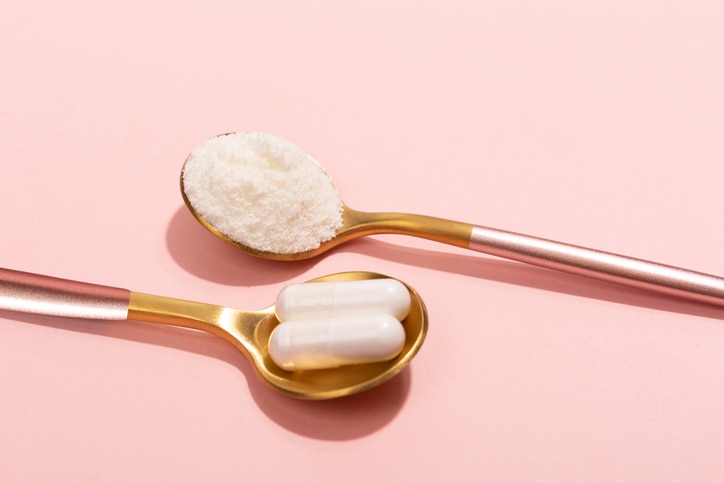What Is Collagen?
Collagen is the most abundant protein in the body, making up about 30% of the total protein content. It is the essential “glue” that helps to hold connective tissues together. Collagen can be found in muscles, bones, skin, ligaments, and tendons. The body naturally produces collagen by breaking down dietary proteins into amino acids, which are then used to build collagen. This process requires certain nutrients, including vitamin C, zinc, and copper. However, collagen production starts to decline as you age, leading to signs of aging such as wrinkles, sagging skin, and weaker joints. Collagen in full length cannot be absorbed in the digestive tract because of its length and spatial conformation.

Exploring Collagen Peptides & Supplements
Collagen peptides, also known as hydrolyzed collagen, are shorter chains of collagen that have been broken down for easier absorption by the body. When we refer to collagen supplements, we are specifically talking about collagen peptides supplements.
In recent years, various forms of collagen supplements have gained popularity, such as hydrolyzed collagen pills, collagen powder, and collagen drinks. Collagen supplements are made of the bones of animals, the skins of cow and fish scales. Most of them are hydrolyzed and could be absorbed by our bodies easily.
Advertising taglines often claim that consuming collagen can enhance skin health, improve elasticity, and alleviate joint pain. But do collagen supplements really work? 🤔
Benefits of Collagen Supplements

1. Improve Skin Health
Collagen can strengthen our skin to prevent the formation of wrinkles. It can also enhance the skin elasticity and hydration to soothe dry and broken skin. According to the research results, daily intake 2.5–5 grams collagen supplement for 8 weeks (about 2 months) can help the skin cells keep renewing and repairing. Skin elasticity and skin moisture can be improved significantly.
2. Improve Joint Health
Collagen helps to protect the integrity of cartilage to enhance the flexibility of joints and reduce joint pain. Based on some studies, you are suggested to consume 8–12 grams of collagen supplement daily to relieve joint pain and slow down age-related joint deterioration.
3. Improve Bone Health and Prevent Bone Loss
Bones are mainly made of collagen. That’s why collagen is good for the formation of new bone. It can also strengthen the bones. With reference to the study result, women who took 5 grams of collagen daily for 12 months increased around 7% in the bone mineral density.
4. Improve Appearance of Hair & Nails
Hair and nails are composed of a protein called keratin, supported by collagen fibers in the hair follicles. Collagen helps to provide structure and support to the hair follicles, promoting healthy hair growth and preventing breakage. A sufficient intake of collagen reduces nails brittleness and improves their overall appearance.
Types of Collagen Supplements: Collagen Powder, Liquid Collagen & Collagen pills
There are different forms of collagen supplements, but the differences really lie in the formula and prep time rather than the form itself. Here are the pros and cons of various forms of collagen supplements.
1. Collagen powder
A hydrolyzed and powdered version of collagen taken from animal tissues. Adequate doses per serving size, with the average serving size for a single scoop of collagen powder ranging from 10 to 20 grams (because that’s the most effective dose of collagen), while the serving size for liquid collagen is anywhere from 4.3 to 7 grams.
Pros:
- Versatile and can be added to coffee, yogurt, smoothies, and more
- More cost-effective than liquid collagen for the same doses
Cons:
- Chalky taste if not mixed thoroughly
Some popular collagen powder options include:
- Kinohimitsu Collagen Beauty PRO
- Kinohimitsu UV-Bright PRO
- NH Beau Wite
- Ever Collagen Collagen Time Apple Flavoured
- SURYA Zeleb+ NMN
- BB Lab Low Molecular Collagen Panthothenic Acid
- YOUVIT Beauty Collagen Powder Drink
- BB LAB Low Molecular Collagen Biotin Plus
2. Liquid Collagen
Usually formulated with marine collagen, which contains predominantly types I and II collagen.
Pros:
- Digested and absorbed into the bloodstream more quickly & efficiently
- Convenient to consume, great grab-and-go option
Cons:
- May contain less collagen per serving compared to collagen powder
- Often higher in calories due to added flavors
- Single-use packaging tends to be less eco-friendly
Some popular liquid collagen options include:
- NH Bird Nest Botanical Beverage Collagen With Cactus Plus Grapefruit
- NH Bird Nest Botanical Beverage Collagen With Aloe Vera Plus Lemongrass
3. Collagen Pills
Pros:
- Convenient to take
- Easy to add to the routine
Cons:
- Smaller collagen doses per capsule or pill compared to per serving of collagen powder
- Less flexibility in ways of taking
Some popular collagen pill options include:
Side Effects
Generally, collagen supplements are considered safe to consume without any major side effects. Some people may experience mild digestive symptoms e.g. bloating & feeling of fullness after taking the supplements.
If you have food allergies, make sure to purchase supplements that don’t contain your allergens, e.g. seafood & eggs.
A rarer side effects of taking collagen could be both diarrhea and constipation, as your body is overloaded with processing a lot of collagen proteins from your supplements.
Always talk to your healthcare provider or doctor before taking a supplement.











